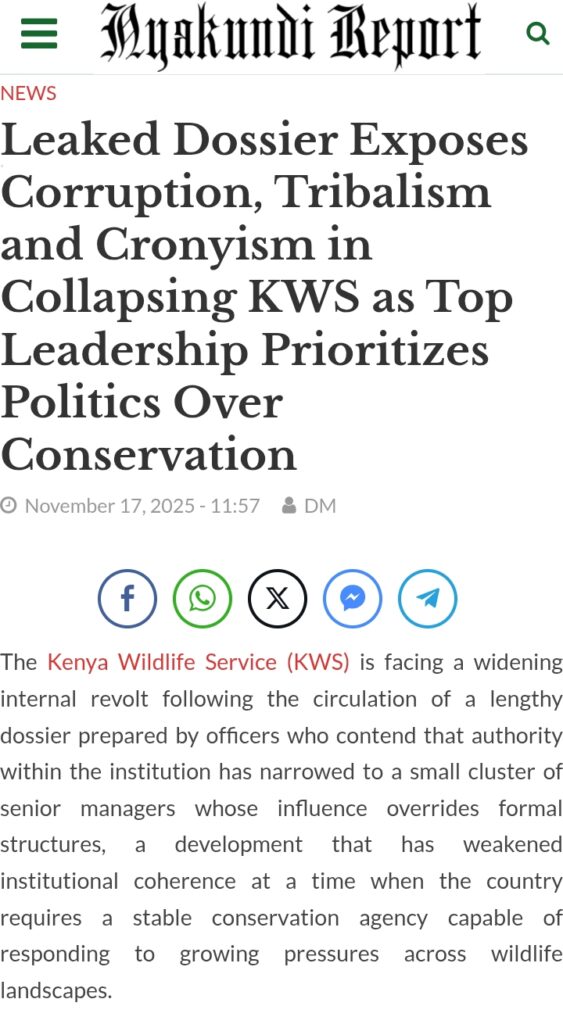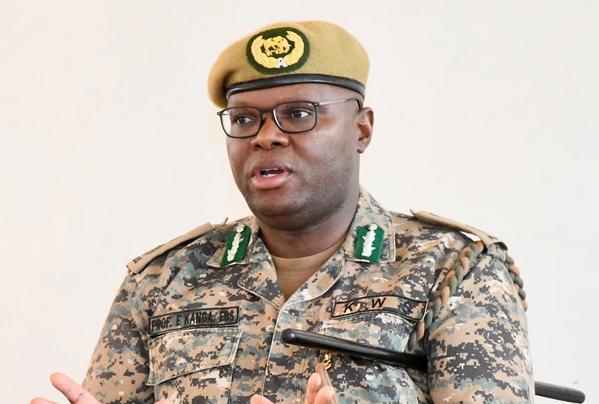Growing tension inside the Kenya Wildlife Service has raised deep concern among officers who believe the institution is drifting away from the professionalism and stability it once depended on.
According to a detailed internal dossier, many staff members feel that real authority has shifted into the hands of a small group of senior managers whose decisions override established structures.
They argue that this concentration of power has weakened teamwork, silenced technical voices and left the organisation struggling at a time when wildlife conservation demands strong and coordinated leadership.
The document paints a picture of a workplace where consultation has diminished and major decisions bypass technical departments. Officers say this trend has created fear, low morale and a sense that anyone who questions orders risks informal punishment.
These problems appear at the same time the country is dealing with increasing pressure on wildlife ecosystems. Staff warn that if this continues, KWS may face a collapse of its institutional stability.
Concerns also arise from legislative interference, especially during the review of the Wildlife Conservation and Management Act.
Proposals prepared by experts inside KWS were allegedly set aside in favour of short-term administrative views.
Officers fear this may weaken Kenya’s voice in global conservation and reduce the quality of policies guiding wildlife protection. Political influence over deployments, hiring and community relations is also highlighted, with many noting that the Director General’s directives often pass through a small circle of close aides who shape decisions without wider participation.
The strategic plan launched recently appears to have lost momentum. Departments working on conflict mitigation, tourism development, security and community relations report that they are unable to progress due to confusion, lack of resources and unclear guidance.
Human resource challenges dominate the report, with cases of irregular promotions, unexplained transfers and recruitment without advertising. Junior officers are said to be appointed into roles requiring years of experience while seasoned experts remain without formal placement, creating resentment and frustration across the service.
Welfare concerns are equally serious. Staff say uniforms have not been issued for three years, boots are unavailable and internal meetings have stopped.
Stress levels are rising, and some officers are battling depression, alcoholism and family breakdowns caused by sudden transfers with little support.

The traditional system of hiring lower-cadre staff from surrounding communities has also been abandoned, weakening local cooperation in conflict-prone areas.
Other issues include unqualified officers holding sensitive positions, dormant oversight committees, inconsistent disciplinary actions and deployment patterns that create the impression of ethnic imbalance.
Training opportunities abroad are reportedly restricted to a small group, while female officers say they have no representation in top management and face limited chances for advancement.
Field operations are further affected by reduced financial autonomy, slow legal support, dilapidated infrastructure and a marketing division that focuses on events rather than boosting tourism.
Procurement challenges and mining activities inside protected areas also raise fears of corruption and environmental degradation.
Officers conclude that these combined problems weaken KWS at a time when climate change, human-wildlife conflict and tourism recovery require a strong conservation authority.
They warn that unless urgent reforms are introduced, the organisation risks collapse, putting Kenya’s wildlife heritage and conservation commitments in danger.





















Add Comment